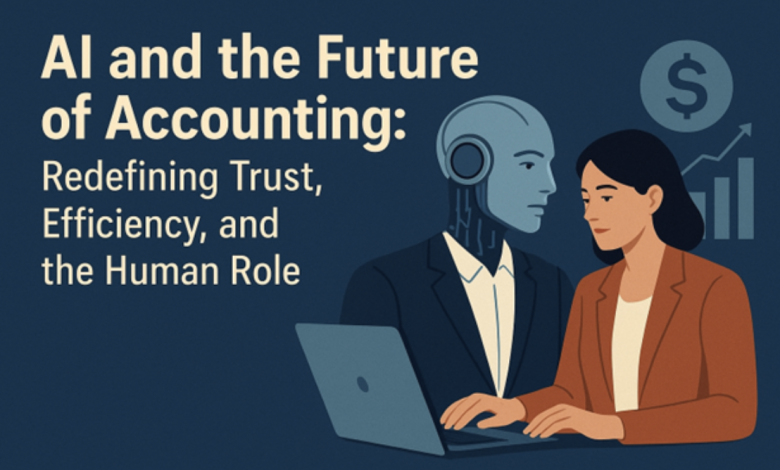
One of the biggest topics in the accounting industry right now is whether the profession will become obsolete with the introduction of Artificial intelligence (AI). Change often sparks fear which prompts pushback from accounting leaders who do not want to see the profession become inhumane or irrelevant. However, oftentimes, it is too late for this conversation because AI is no longer an abstract concept reserved for tech firms and research labs… It is increasingly embedded into the every-day life and future of accounting.
In an industry defined by compliance, trust, and precision, AI is transforming how financial data is captured, analyzed, and interpreted. From predictive tax planning to fraud detection and error identification, the applications are extremely broad, yet have expansive impact. What makes accounting’s relationship with AI unique is not just efficiency, but it’s the fundamental question of how we can balance integration of AI with responsibility, innovation with trust, and data-driven insights with human judgment.
This article explores how AI is reshaping accounting and finance, the challenges that must be addressed, and why the human role will remain central even in an era of increasingly autonomous tools.
The State of AI in Accounting
Historically, accounting technology followed a linear progression: from manual ledgers to spreadsheets, then to digital software for payroll, auditing, and tax. For a lot of practitioners, AI feels like a step-change, rather than a continuation or small-step forward. Unlike static systems, AI evolves with data, learning from patterns and anomalies to make recommendations, detect risks, and even forecast future outcomes.
Some of the most impactful applications today include:
- Automated data entry and classification – AI models can categorize transactions with greater accuracy than rule-based systems which reduces human error and frees up accountants for higher-value tasks like advisory.
- Natural Language Processing (NLP) – Tools can examine tax codes, contracts, and compliance documents at scale, surfacing only the most relevant sections for review.
- Predictive analytics – By analyzing historical financial data, AI can forecast future revenues, cash flow, and even regulatory risks.
- Continuous auditing – Instead of annual or quarterly audits, firms can now monitor transactions in real time, flagging irregularities instantly.
For many firms, these innovations are not just cost-saving… They fundamentally reshape what accounting means in practice and what day-to-day operations look like.
Trust, Bias, and Transparency in Financial AI
If marketing or design AI outputs a flawed result, the worst consequence may be reputational or that it just looks bad. In accounting, however, errors carry financial, regulatory, and legal risks. A misclassified expense, an overlooked transaction, or a biased fraud-detection model can lead to fines, compliance failures, or loss of stakeholder trust.
This raises three key challenges for the industry:
- Explainability: AI must be auditable and interpretable. A CFO or CPA cannot rely on a recommendation without understanding the rationale. Conversations in government show that regulators will increasingly demand this transparency.
- Bias mitigation: Training data often reflects systemic biases. In accounting, this could mean disproportionately flagging certain vendors, clients, or transaction types as “risky.” Firms must establish frameworks to identify and correct such biases to correct the inherent bias.
- Governance: AI in accounting must align with ethical standards, such as the AICPA Code of Professional Conduct. Governance frameworks, similar to internal controls for financial reporting, have always been important but are now becoming essential to drive productive movement forward.
The solution lies in human-AI collaboration—AI systems handle pattern detection and scale, while accountants validate outputs, provide judgment, and ensure compliance.
AI and Workforce Transformation
The World Economic Forum estimates that over 40% of core skills for workers will change by 2027 (WEF). In accounting, you can already see this happening over the last few years.
Tasks most at risk of automation include:
- Data entry and reconciliation.
- Expense categorization.
- Standard compliance checks.
But, new roles are emerging just as quickly as old tasks are disappearing:
- AI auditors, responsible for validating algorithmic decisions against accounting standards.
- Data translators, who convert AI-driven insights into actionable strategies for executives.
- Strategic advisors, who leverage AI’s predictive power to guide clients through expansion, M&A, and investment decisions.
This shift requires not just reskilling, but a mindset change. Accountants are moving from “historians of the business” to strategic navigators of its future. Firms that invest in continuous learning and AI fluency will be better positioned to retain talent, deliver value, and increase profits.
Use Cases Across Accounting and Finance
Let’s look at some specific, real-world use cases.
- Fraud Detection and Risk Management
Banks and audit firms are already deploying AI to analyze millions of transactions for anomalies. Instead of relying on rule-based thresholds (e.g., transactions over $10,000), machine learning models adapt to evolving fraud tactics. This real-time surveillance has significantly reduced financial crime exposure and increased response timeliness.
- Tax Planning and Compliance
Global tax codes are notoriously complex and frequently updated. AI can ingest new legislation, compare it against historical filings, and recommend optimized tax strategies. In particular, multi-nationals can benefit from this when navigating cross-border compliance or business-owners with complex entities.
- Financial Forecasting
Predictive AI models help CFOs and CPAs anticipate future cash flow fluctuations, identify working capital gaps, and plan for capital investments. Unlike traditional forecasting, which relies heavily on historical averages, AI integrates market data, supply chain disruptions, and macroeconomic factors.
- Audit and Assurance
AI-powered continuous auditing reduces the reliance on retrospective reviews. Auditors can now provide a more valuable form of assurance on financial statements, strengthening investor trust.
- Sustainability and ESG Reporting
With investors and regulators demanding robust ESG disclosures, AI can help aggregate and validate data from disparate sources. For example, AI can track carbon emissions across supply chains, aligning accounting with sustainability reporting standards.
The Convergence of AI with Emerging Technologies
AI in accounting does not exist in isolation and it is increasingly intersecting with other technologies, creating entirely new possibilities.
- Blockchain: Immutable ledgers enhance transparency, while AI automates reconciliation and fraud detection within those ledgers. Together, they could redefine audit practices.
- IoT: Real-time data from connected devices (e.g., manufacturing equipment or logistics fleets) feeds into AI systems for real-time asset valuation and depreciation accounting.
- Quantum computing: While still nascent, quantum’s potential for processing financial simulations could revolutionize areas like risk modeling and tax strategy.
These convergences point to an accounting future that is not just faster but fundamentally smarter.
Ethical and Regulatory Outlook
Regulation is beginning to catch up with AI’s growth. In the U.S., agencies are discussing oversight for financial AI tools, while the EU AI Act sets out risk categories for deployment. For accounting firms, this means AI adoption cannot be viewed as a technology project alone but potentially as a governance initiative.
Firms should establish:
- AI ethics committees, mirroring audit committees as the foundation.
- Documentation protocols, ensuring all AI-driven decisions can be explained and defended.
- Training programs, ensuring staff understand not only how to use AI but also its limitations (e.g., when to use and how to use).
The firms that lead this transformation will be those that not only adopt AI but embed accountability into its use.
Why the Human Role Still Matters
Even in a world of predictive analytics and automated compliance, one truth remains: accounting is about trust. Clients, regulators, and investors rely on human professionals to interpret data, weigh trade-offs, and act ethically.
AI may recommend the most tax-efficient strategy, but it cannot assess reputational risk or align decisions with long-term corporate values. Similarly, it cannot provide the empathy required when advising a struggling business owner or negotiating with regulators.
Accountants are much more than just “number crunchers,” but ultimately act as business advisors for many individuals and companies.
The future accountant, therefore, is not displaced by AI but elevated. Freed from routine tasks, they become stewards of trust, interpreters of data, and strategic partners in business growth.
Conclusion: Accounting at an Inflection Point
AI is transforming accounting from a backward-looking function into a forward-looking driver of strategy. The shift is not without challenges—bias, governance, and workforce disruption must all be addressed—but the opportunities are unprecedented for those ready to take advantage.
For c-suite leaders, the key question is no longer whether to adopt AI, but how to do so responsibly. Firms that invest in transparency, reskilling, and ethical governance will not only unlock efficiency but also strengthen trust which is a currency as critical as capital in today’s business environment.
Ultimately, AI will not replace accountants. Accountants who embrace AI, however, will replace those who don’t.

